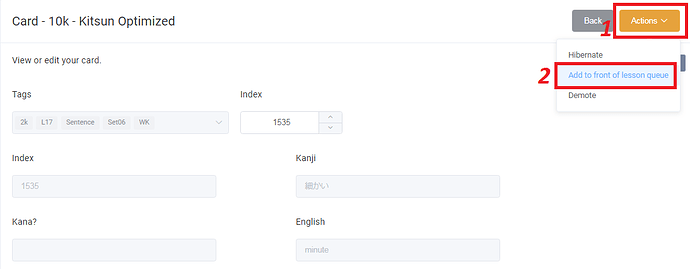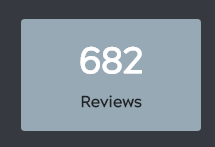This mini tutorial’s goal is to explain you how you can easily add words you see from exposure to your target language to your SRS system on Kitsun and how that makes up for a much more efficient and pleasurable learning. First, I’ll explain how the online communities related to language are approaching vocabulary learning and then I’ll go a little deep on how Kitsun innovates in this same aspect.
If you don’t feel like reading this, jump to the “To sum up” section at the end of this post.
Why you should not limit yourself to the “Most common vocabulary” decks:
One of the first things you find on the Internet once you immerse yourself in the world of language learning is people suggesting flashcard decks with the most common words in a language. For Japanese, there’s the famous Core 10,000 vocabulary deck. For Tagalog, there’s a 2,000 top words’ deck.
The concept is very simple and quite attractive: a moderate amount of words account for a much bigger part of the day-to-day vocabulary. For example, according to Oxford English Corpus, the 7,000 most common English words account for approximately 90% of usage. The cool thing to take into consideration is that this concept applies to pretty much all languages. In other words, if you focus on learning these most common words’ lists, you’ll be taking quite some steps ahead in your path to fluency.
However, it’s not that simple. Taking Oxford’s analysis into consideration, you’ll still need to know that 10% left. It might not seem as that big of a problem, but once you pick up a book in your target language (or any other source of content really), you’ll realize that stopping every 10 words to figure out that one word that you have yet to learn is quite a big of a mess.
The lesson to take from this is that even though you definitely should take as a priority to study the decks with the most common words in a language, do not neglect the fact that the path to fluency requires much more than that. The lists of the most common words are one the best things Internet has given us, but realizing that having a good hold on passive vocabulary one might be exposed to is definitely also a thing to take into consideration while learning a language.
In the next chapter, I’ll talk about the powerful benefit that learning words from exposure has versus SRSing lists of the most common words.
The power of learning through context:
One of the first things we need to keep in mind is that a good translation is quite a difficult feat to achieve. If you know at least 2 languages, you have probably found yourself struggling with translating words in a literal way. Sure, there might exist a translation for a certain word, but you still feel like doing so will make you miss many cultural nuances that vocabulary carries. Translating such words might even make you feel like you’re doing a mistake.
For example, the Japanese words 克明, 細かい and 詳しい can all be translated to “detailed”. However, they are not quite the same. 詳しい and 克明 carry a positive connotation while 細かい can have both a positive and negative one. 細かい can be used with both abstract and physical things while 詳しい is exclusively used in abstract contexts. All these three words show up in the most recommended list of the 10,000 most common words in Japanese, but these nuances are something you wouldn’t necessarily obtain through using the deck itself. All you would see would be these three words meaning “detailed” on the back side of the card. “Great, now which one should I use then?..” This is precisely where context is King.

I know this image seems scary for those not learning Japanese, but please bear with me.
Let’s imagine I was reading an article about the different types of sugar (in Japanese). In this article, I noticed the expression 『細かい砂糖』. I already knew that 砂糖 means sugar and that 細かい means “detailed”. However, I was also able to learn that in this context, 細かい means “fine” as in “fine sugar”. Here’s the problem: in English, the word “fine” can mean all kinds of different things:
- I’m fine.
- You’re quite fine

- What a fine piece of art!
- You need to buy fine sugar for this cake recipe.
Until now, all I knew was that 細かい means detailed and maybe fine, if the deck where I learned that word from even included that last meaning. However, without being exposed to the language (exposure to context), I certainly would not have guessed the correct way of saying “fine sugar” in Japanese.
This is the power of context, which allow us to dig deeper into our target language. However, now you ask: “why do I care? How is this going to improve the way I learn a language?”
What if after exposing yourself to new words, you were able in a matter of seconds to add them to one of your decks and start SRSing them right away? What if you could combine the best of both the world of SRS and the world of exposure at the same time? This is where the power of Kitsun comes in. 
Using the dictionary feature to start learning vocabulary from exposure right away:
Let’s imagine now that I didn’t knew the word 細かい before. I was reading this blog post and realized that this word was still unknown to me.
Due to the fact that Kitsun has the well-known jisho.org JP <=> EN dictionary integrated, I was able in a matter of seconds to
- Search for the word in the dictionary;
- Learn its meaning;
- And most importantly, generate a flashcard instantly so that I can start SRSing it.
Now, not only I have a more concrete idea of how 細かい was used (due to learning its context first), but now I can also immediately start learning this word through Spaced Repetition System so that this new knowledge really solidies and stays for the long-term. If I was to merely depend on the SRS system, all I’d know would be that 細かい means detailed/fine, not its actual correct usage (detailed/fine what?..)
Using community decks to immediately SRS words from context
Remember how I mentioned above that learning the most common words isn’t the end of the race, even though it’s quite an effective way of learning? After all, not only context and exposure to native content have their merits, but there’s always more important words out there to learn (remember those 10%?).
Well, but what if you could do both at the same time? 
Let’s say that I decided to add the Core 10k words for Japanese by @hinekidori to my decks and started learning it. Eventually, I was faced with the word 細かい in native content, but I had yet to learn it through SRS. Guess what, maybe that’s a word that it’s present in this so called 10,000 most common words in Japanese?
Guess what: it’s there! But wait, can I start learning this word right away?
Booom, you just added it to your lessons! 
So not only you get the benefit of SRSing a word immediately after exposure, but you also get to focus on the most common words of your target language. With this method, you’re able to focus on both improving the quality of how you learn a word, but you also get to focus on those words that will definitely show up more times.
To sum up:
- Learning vocabulary through SRSing a deck of the most common words is definitely a big step towards fluency, but it’s far from being your final one.
- Learning words through exposure allows you to understand the nuances you never thought were there.
- With the dictionary feature available on Kitsun, you can search for a word’s meaning right away and make a flashcard of it almost instantaneously.
- Even better, you can search for that same word on the deck with the most common words in your target language (if available) and see if that word is there. If so, you can combine the benefits of exposure + using that deck itself, and add the word to your lesson batch to start learning/SRSing it right away.
Observations:
- This tutorial gives examples from the Japanese language. However, these same principles can be applied to any other language that you might be learning.
- This tutorial might get updated due to the fact that Kitsun is constantly improving.
Feel free to comment/ask away/give suggestions 





 .
. Sorry, confused.
Sorry, confused. And the results have been wonderful.
And the results have been wonderful.

